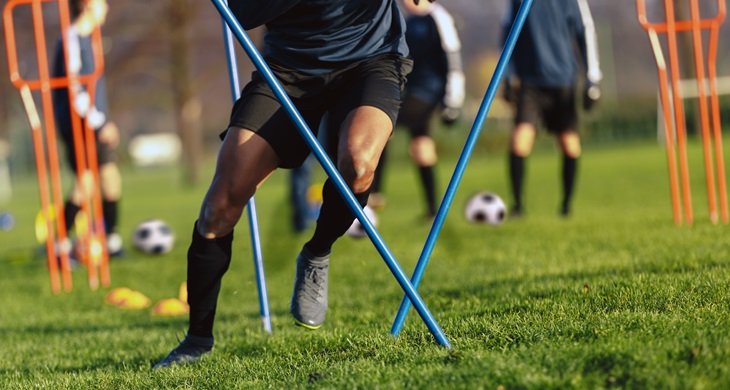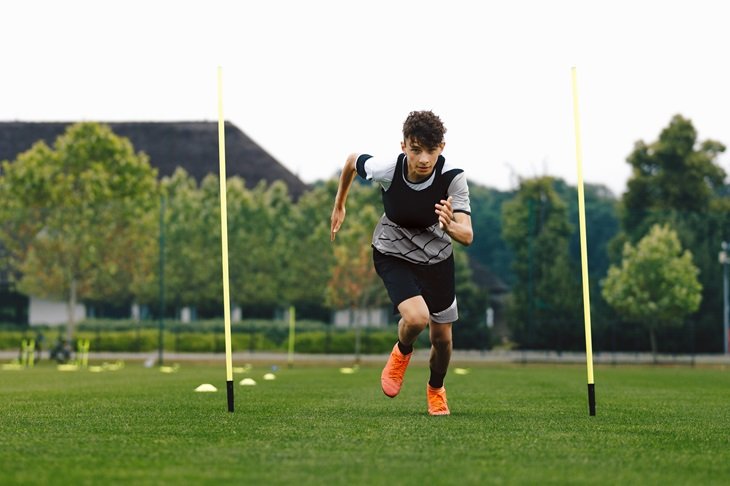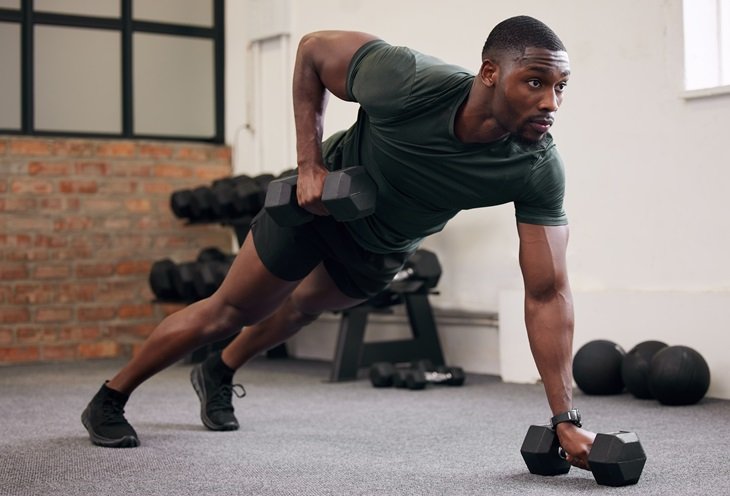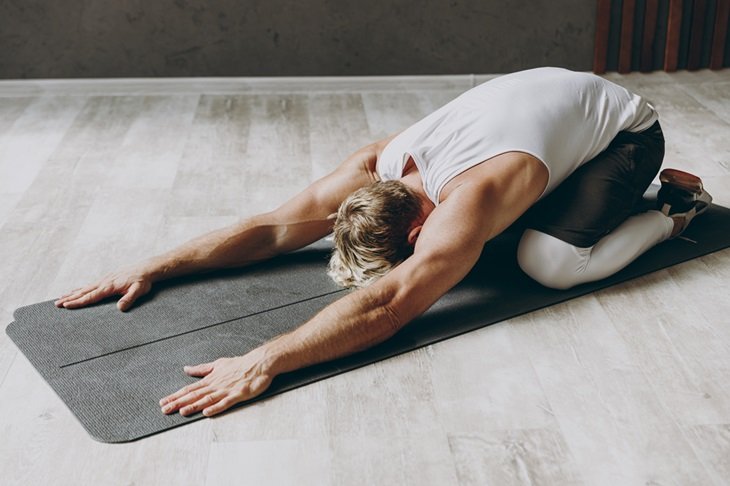
The football season may have only just finished for most teams across the UK, and players and coaches will be looking forward to a few weeks off, but it is vital that players keep fit in the football off-season.
Staying fit during the off-season will maintain your performance levels, reduce the risk of injury when the season starts back up again, and will help you get a head start on teammates and opposition players who haven’t done any fitness training.
From tips on creating a training plan to exercises that can build stamina, here are some different types of exercises and plans that players of all levels can try to keep fit during the off-season.
Tips to keep fit in the football off-season
- Create a training plan
- Give your body a chance to recover
- Cardiovascular and aerobic training
- Ball work and skill exercises
- Train three times a week
- Strength and resistance training
- Agility and speed training
- Flexibility and mobility training
Create a training plan

First and foremost, you need to create a structured training plan that includes exercises covering all fitness aspects.
These plans need to be varied and should include strength training and resistance training, as well as sessions that work on explosive power and improve stamina, flexibility, and agility.
As part of your training plan, you shouldn’t purely focus on exercises without the ball; you should include exercises that involve ball work. You must not overtrain, and your training plan should include plenty of rest days.
ALSO READ: Football training equipment to use at home
Give your body a chance to recover
Summer is the perfect time for the body to recover from any niggling injuries, and it is vital that during the off-season, you give muscle joints and the soft tissue surrounding muscles the chance to heal.
Older players, in particular, will take longer to recuperate. A reduced training load, physiotherapy and even alternative medicine can help accelerate recovery.
Lucas Kruel, who is a personal trainer for professional athletes around the world and a guest writer for Trust My Coach, says that to keep fit, footballers must get enough rest:
“The goal in the off-season is to not begin training for personal bests or to kill yourself in the gym. The goal is to recover and then prepare the body to return to the pitch feeling fresh and ready to go.
“Over the years, I have seen athletes over-train in the off-season... which doesn't allow the body to recover and increases the risk of injury/exhaustion; and I have also seen athletes do absolutely nothing in the off-season which can result in poor condition and a higher risk of injury.”
Cardiovascular and aerobic training

The end of the season isn’t an excuse to do nothing. Stamina for football is vital as it means you can keep making those lung-busting runs to track opponents or to get on the end of a cross or pass, but just one week of complete rest is enough for aerobic fitness to drop by five per cent.
This means your stamina levels will quickly plummet, and your ability to do high-intensity exercise, such as repeated sprints, will also rapidly decline.
You should aim to do three to five sessions a week that include some form of cardiovascular training.
Exercises you can do during the off-season to improve your cardiovascular fitness:
- Running – you can vary runs to include long-distance and interval training.
- Swimming – this is great for overall conditioning and is a great exercise for footballers who struggle with pain in their joints.
- Cycling – a low-impact alternative to running.
ALSO READ: Thank you gifts for football coaches
Ball work and skill exercises
Keeping fit during the football off-season doesn’t mean that all your training sessions have to be done without a ball. There are lots of exercises that you can do on your own with training footballs that can improve not only your fitness but other areas of your game.
By incorporating the ball into your exercises, you are keeping skills sharp, such as your first touch and dribbling.
Exercises you can do that involve a football and will help your fitness:
Dribbling: If you have football poles at home, you can set up a maze of poles or cones and dribble the ball between and around them using both your left and right foot.
Passing and shooting: You can set up football rebound boards at an angle to the goal. Once you have them positioned, you can pass a football against them, run onto the ball, and shoot at the goal.
Circuit training: Circuit training sessions are something that many coaches will set up for teams during pre-season, and if you want to get ahead in your fitness preparation, you can easily set one up at home. To get a good mix, you should set up stations that involve a ball and others without a ball.
ALSO READ: What are the best penalty kick training drills?
Train three times a week

To keep fit during the football off-season, it is vital that you strike the right balance between exercise and rest.
On the football magazine website FourFourTwo, Brock Christopher, the EXOS performance manager, recommends footballers train three times a week and train for short periods of time:
“A 30-minute, three-day per week conditioning programme is ideal. A mixture of long, slow runs, change of direction drills and shuttles, as well as sprint training over 20-30 metre distances with limited recovery periods should be included. This will help maintain conditioning, joint mobility and body strength.”
Strength and resistance training

Building and maintaining muscle strength is essential, and that is why modern professional footballers spend a lot of time in the weight room, lifting barbells, dumbbells, and medicine balls to build the strength and muscle they need to perform at the highest level.
The Soccer Supplement told us about the benefits footballers can gain from strength and resistance training during the off-season:
“A good degree of strength in both your lower and upper body is handy for winning tackles, one-on-ones, and aerial battles. Dealing with the physicality of the game is important at top-flight level, but perhaps even more crucial in Sunday League!
“Meanwhile, lifting heavy weights can also boost your running speed. Other benefits include increased confidence, better balance, and a lower risk of injury, as resistance training can strengthen important joint-stabilising muscles.”
Exercises you can do to improve your strength:
- Squats and lunges
- Deadlifts
- Bench presses and press-ups
- Core workouts such as sit-ups, planks, and leg raises
ALSO READ: What are the best goalkeeper training drills?
Agility and speed training
Football is a game full of fast bursts of speed and quick directional changes, and speed and agility workouts for football are a great way to ensure you are in great shape as you head back for pre-season training.
Drills that work on your speed and agility are important because they can teach players how to create space for themselves and move quickly in any direction, whether it is running in a straight line or going on a mazy dribble.
Exercises that improve your speed and agility:
- Cone drills: You can set up football cones in different patterns to improve your footwork.
- Ladder drills: Football training ladders are perfect for improving coordination and footwork.
Flexibility and mobility training

Working on your flexibility and mobility during the off-season will reduce the risk of injury and it can improve your performance.
Attending classes or including exercises in your off-season training plan is something many professional and amateur footballers do during the summer break.
Dynamic stretching before workouts and static stretches after exercise can really help a footballer's flexibility, and it can reduce muscle soreness.
Yoga and pilates are other activities that can enhance your flexibility, and they can also improve your relaxation.
ALSO READ: Football workouts to improve your fitness and your game
Staying fit during the football off-season requires a balanced approach that consists of strength training, cardiovascular fitness, and exercises to aid your flexibility. Following such a plan will help you perform at your best and come back to pre-season training in your best shape.
Are you looking for football products to help you maintain your fitness levels in the off-season? Browse our website and pick up everything you need from Diamond Football.
For more tips, guides, and advice, visit our news page.





